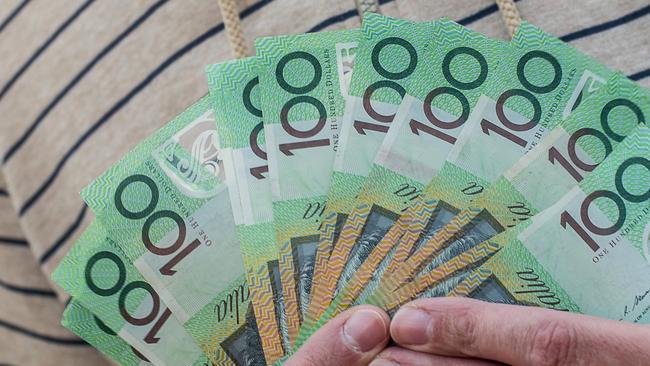How to super-size your super for a bright future: James Kirby
Getting your finances sorted for 2023 should begin with getting your superannuation in order – here’s how.
You probably want to do better financially in 2023 and there are many ways to get the ball rolling. But the opportunity most likely staring you in the face is superannuation: Unlike everything else, superannuation is not a choice, it’s mandatory.
Think about it: For every $10 you make when working, more than one dollar must, by law, go into your super through what is called the Superannuation Guarantee Charge.
You have no choice but to put that money into the super system, but crucially, you do have a choice what to do with those funds. After all, it’s your money.
You can get more bang for your buck in super by making sure you don’t have duplicate funds, by checking if your fund is not a dud, or you can take it to the limit and start your own self-managed super fund. (More on all these options later).
But first you have to get a grip on the basics.
Beginner’s guide to superannuation
Here’s an absolute beginner’s guide in five points. These are the very latest numbers reflecting the Budget we just had in October 2022.
1. If you work and have not yet retired, then every dollar that goes into your super is taxed at 15 per cent on the way in.
2. As your super fund makes money on those accumulated contributions each year, those profits are also taxed at 15 per cent every year until you retire.
3. Once you retire the profits you make on your super – known as the income – is tax-free up to a certain limit: That limit or ‘cap’ is $1.7m – Once the fund crosses that ‘cap’ the income made on the amount of money above the limit is taxed at 15 per cent. You can have an unlimited amount of money in the super system (for the moment, this issue is under review).

4. There are ways you can boost your super: The first way is called pre-tax (or concessional) and you can put up to $27,500 from your pre-tax income into your fund each year. However, keep in mind that the $27,500 includes whatever is taken out by law by the SGC. So if you made $150,000 in a year pre-tax- your SGC would be 10.5 per cent of $150,000 which is $15,750. So in reality the amount you could contribute (or salary sacrifice) is $27,500 minus $15,750 which works out at $11.750. The other way you can boost super is that you can put in $110,000 per annum post tax (non-concessional): So if you happen to have large amounts of money where you have already paid tax on the sum, and you wish to put it into super, you can do so.
5. What about accessing your super before you retire? After a brief period in the pandemic when people were allowed to crack open their super and take money out, we have reverted to normal rules: You can only take money out if you face ‘extreme hardship’ the conditions where the tax office will let access your super early are extremely onerous such as terminal illness.
Clean up your super
Once you get a handle on those five key points, cleaning up your super as a first step towards making money in 2023 should become a lot easier. It might be your money inside super, but sometimes it might not feel that way: You can’t touch it until you retire and there is a certain amount of paperwork to be done if you want to change anything, but it’s not that hard.
As an absolute minimum, you must ‘clean up’ your fund if you have money in more than one fund, which is quite possible if you have worked in a few different places. (For younger workers this is now less likely because new laws mean that most workers stay with their first fund throughout their career unless they choose to make a change).
Consolidate your super into one fund and make sure it is the best fund you can get.
Perhaps one of your funds is perfectly fine, but to make sure, take a look at the performance figures. Once upon a time it took an amateur detective to figure out which funds were doing best, we now have a partial view through the so-called performance tests. If you go to mysuper or the ato.gov.au and check the super performance tables, you will get an elementary guide.
So far, the test is best for spotting duds rather than telling you if your fund is a real winner. But it remains a very useful service, and it is due to get better when more funds are included. For the moment, if you see your fund is listed as ‘underperforming’ – it may be time to switch your super fund. Otherwise, just check the ‘8-year performance’ returns of your fund against the rest of the pack, and you will get a good idea of whether your fund is good enough for you.

If you can afford to contribute a little more to your super, especially if you are ‘younger’ i.e. under 40 then you will be very well rewarded by doing some ‘salary sacrifice’ because over the decades until you retire your investments will compound – ‘The sooner you get started the better’ is a strong rule in super savings.
Self-managed super funds
For those who really want to take control, there are self-managed super funds, which are used by more than 1 million people. If you understand investing and if you commit to a few hours a month managing your money, then by all means consider an SMSF.
There is a wide debate over how much time can be spent in running your own fund, the answer is ‘it depends’ – a complex fund will take some hours a month, a simple fund might only take a few hours of concentration a year.
How much should you have before you begin an SMSF? – Industry professionals will say around $300,000 to $600,000 – this is a very general guideline, as fees and complexity increase in this area a figure closer to $600,000 is the best guide for most investors.
Can you use the money inside your super fund for anything other than retirement savings? Yes, there is an exception.
The First Home Super Saver scheme allows you to make voluntary contributions before or after tax up to a certain amount – $15,000 a year or $50,000 in total: It is an awkward scheme best for those on high salaries who were going to buy a house anyway – there are only a limited number of spots in the scheme, and it has been only a modest success to date.
Track your superannuation
While you are working all these super items out, you are probably asking yourself the sector’s favourite question: How much should I have in super?
There is an inordinate amount of time spent on this puzzle each year – the reality is that there is no single answer. A recent survey hit the headlines linking your date of birth with your required amount of super: It said if you were born in 1955 you should have $535,000, if you were born in 1965 the figure would be $219,000, 1975 required $219,000 etc. But averages mean little in such a complex area where everybody has different needs and material desires.
In one way, you don’t need any super at all: We have a government pension scheme. At the other end of the line, there are those who believe that a proposed $5m per capita cap on how much you can keep in super is not fair.
And so, the short answer is put as much into super as you possibly can, it’s the best tax break for all Australians. The secret of success is to optimise your super strategy to get the best result for you.
*This is the first part of our summer investment bootcamp series. A podcast on this feature can be heard on The Australian’s Money Cafe podcast – Summer Bootcamp series.








To join the conversation, please log in. Don't have an account? Register
Join the conversation, you are commenting as Logout